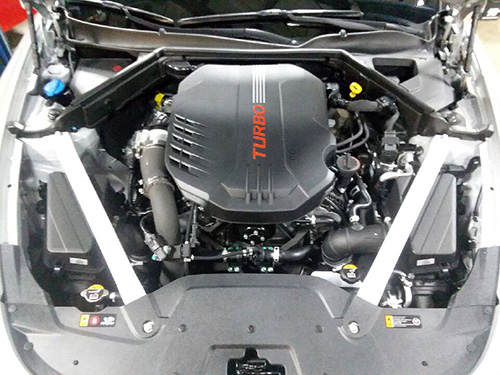Luke's Car Tips & Auto Maintenance Advice
Luke's posts regular blogs to offer you great information and advice about your car maintenance. Check back often for new posts. Search for a specific topic!
 Luke Shaff
Luke ShaffClick to view Original Document

As a professional technician and independent garage owner, I usually hear that refrain all too often. Usually, it is uttered by someone I've never seen before and precedes a Stephen King-like narrative documenting years of frustration, even terror, at the hands of individuals masquerading as automotive service professionals.
Life for such people is a constant and recurring nightmare of problems never resolved and service expectations never realized.
But the question implies that the problem of quality automotive services is an availability problem, when that isn’t necessarily the case. There are quality shops and qualified professionals to staff them, although the number of both is shrinking. The problem with finding good people and service is not accessibility, it’s cost. Before we go any further, you need to understand why automotive service is more expensive today than in the past.
In every industry you encounter costs related to that industry’s nature. Some industries are labor intensive, requiring a highly skilled craftsman - master cabinetmaker, for instance - who carries his skill in his head and in his hands. The tools of his trade are simple in nature and inexpensive to acquire, while his education and experience go on for a lifetime.
Other industries are equipment intensive, requiring expensive sophisticated machines to accomplish whatever tasks are set before them. The sophistication of the equipment compensates for people who require little training and less skill.
Over the past 15 years, the automotive service industry has become both labor and equipment intensive as a result of high technology: computerized electronic engine controls, fuel management systems, distributorless ignition, antilock brake systems, active suspension, automatic traction control, electronically controlled transmissions and computerized comfort controls.
As this technology has blossomed, we find ourselves in the midst of an information crunch as well. The amount of technical service literature is exploding. So the automotive service industry has become information intensive too.
These three factors are enough to cause service costs to increase exponentially. But there are two other critical factors. One is the serious commitment to environmental responsibility and regulation required by government. The other is the physically demanding nature of the work itself.
While most industries might have to contend with the expense involved in one or two of these areas, the automotive service industry is involved in integrating all five into the day-to-day operation of a contemporary business. Yet most of these factors have remained hidden from the majority of motorists. Consequently, it seems that the only thing that hasn’t changed in this industry is the motoring public’s perception of the service technician and the repair facility.
This may seem a rather lengthy explanation of why the cost of quality automotive service work is continually escalating. However, it is a necessary explanation because there is a correlation between the people who continually ask why they can’t get their vehicles fixed and the people who only shop price when it comes to automotive service.
You see, you can’t compare automotive service jobs as though they were cans of peaches sitting side by side on a supermarket shelf. You can’t walk into your neighborhood garage and buy a half-pound of automotive repair. And you can’t easily comparison shop because terms in this industry have been bastardized to the point that they have no real meaning.
Case in point: What exactly is a tune-up? Ask six different garage owners or technicians and you most likely will get six different answers. And the worst part is that none of them are wrong. Automotive services is still an art, a practice; it is not a science. The professional must exercise his or her own judgment in determining what constitutes the completeness of any procedure. Good or bad. Right or wrong. There is no nationally accepted industry standard for what constitutes any repair or operation.
As a consumer, you need to understand not only what you will be getting for your money, but also whether that service will address the problem you are trying to solve. No tune-up, no matter how complete, can compensate for a mechanical problem such as a burnt valve or weak compression. However, every day across America someone will stand across a service counter and request a tune-up when what they really need is a diagnosis.
People come to us every day and ask (sometimes demand) that we install a starter or a battery to cure the no-start problem they experienced that morning even though that won’t solve their problem. They are reluctant to pay for a systems check (diagnosis) to ensure that the battery is no longer capable of starting the vehicle. They somehow think we should know what is wrong instinctively. They just want us to “put it in,” whatever the “it” might be. Would that same person feel equally comfortable walking into a doctor’s office and demanding that his kidney be replaced?
The unfortunate reality is that you can no longer ignore the need for accurate and complete diagnosis in automotive service today. There are too many variables to consider. And, for the record, there is a difference between a “free estimate” and a “diagnosis.” A free estimate is nothing more than an educated guess. A diagnosis requires time, tools, specialized equipment, a facility, and experienced technician, analysis and evaluation.
Another reason why some motorists are perpetually dissatisfied with the automotive service they receive is their pursuit of a magic bullet: The simple and inexpensive answer to a complicated and expensive problem.
After almost 30 years in the service bay, I am convinced that the only magic bullet is regularly performed preventive maintenance. That is the only sure way I know to reduce overall vehicle service costs and extend the useful life of a vehicle.
Yet some people insist that a car should be like a refrigerator. It should run for 10, 12, perhaps even 15 years, without any service at all. The truth is simple. If you pushed your refrigerator over on its side and slapped four wheels on it, drove it through subzero cold and desert heat, rolled it over potholes and slammed it into curbs, left the door open and the inside light on all night, never serviced it or maintained it - it wouldn’t work well or last long either. It would probably die long before your passenger car or truck would show any signs of strain.
Despite this reality, it is the people who shun normal maintenance programs who cry foul the loudest when they finally get stuck.
Another reason people may experience difficulty in getting their cars or trucks fixed is that they have chosen the wrong person or place. It’s a cinch the best place for automotive service work will not be the lowest bidder.
There may be some good reasons why a facility is significantly cheaper than the competition. They may not have made the same commitment to tooling up for high-tech diagnosis and repair that a quality shop has made. Consequently, they may not have the equipment necessary to efficiently isolate a problem and may be forced to "shot gun" your repair with a stream of unnecessary parts. Their price may be lower because they don’t compensate their technicians well enough to attract people with the skills needed to perform quality work today.
Most of the horror stories I have heard had one thing in common. The motorists involved didn’t spend enough time trying to find the “right place” for service, at least not the right place for them. In some cases, they didn’t give the facility the time or the opportunity to succeed, either.
Automotive service is rarely a budgeted expense and, unless it is maintenance related, it cannot be scheduled and will never be convenient. The result is time lost, frustration and added expense if something goes wrong. How do you keep something from going wrong? Spend as much time picking a facility you are comfortable with as you would spend trying to fix a problem that results from having chosen the wrong place.
Talk to the owner/manager. Visit the shop. What kind of equipment is there? What types of certificates are on the walls? Is the place approved for mechanical repairs by your local automobile club? Are they members of a professional association? How long have they been in business at the location? What is their experience with the local Better Business Bureau? The department of consumer affairs? Are their technicians ASE certified?
These are all indications of how the garage owner sees himself and his technicians in the industry they have chosen for a profession.
Because of the very real shortage of trained and qualified technicians, most of the “good” places are busy. That’s why it pays to get to know your service provider before you are in the midst of a crisis. Most of us would walk on broken glass for our regular clients because we know how important they are to our survival.
That is also why it pays to schedule preventative maintenance. It is one of the easiest and least expensive ways to avoid an unscheduled breakdown. Unless you are a regular customer - and by regular I don’t mean someone who shows up every two or three years demanding immediate attention - don’t come in on a Friday evening at 4:00 p.m. with a crisis and expect to be taken seriously.
Why can’t you get your car fixed?
There are lots of reasons. Some of them are real, some imagined. Some of the blame can be placed on the automotive service industry, and some deserves to be placed squarely at the foot of the consumer. But remember this: There are millions of motorists who get their cars and trucks fixed every day all across America.
They are “regular” customers someplace. They have a home at garages just like mine, in towns and cities just like yours. They have made the effort to be more to us than just another broken car in a never-ending stream of broken cars. They have expressed appreciation for who we are and the role we play in their lives. They have gotten to know us and have allowed us an opportunity to get to know them.
And for that reason alone, they probably wouldn’t understand the question “Why can’t I get my car fixed?”
They would probably shrug their shoulders and reply, “I don’t know. My mechanic takes great care of our family. Maybe you’ve just been going to the wrong place!”
by Mitch Schneider